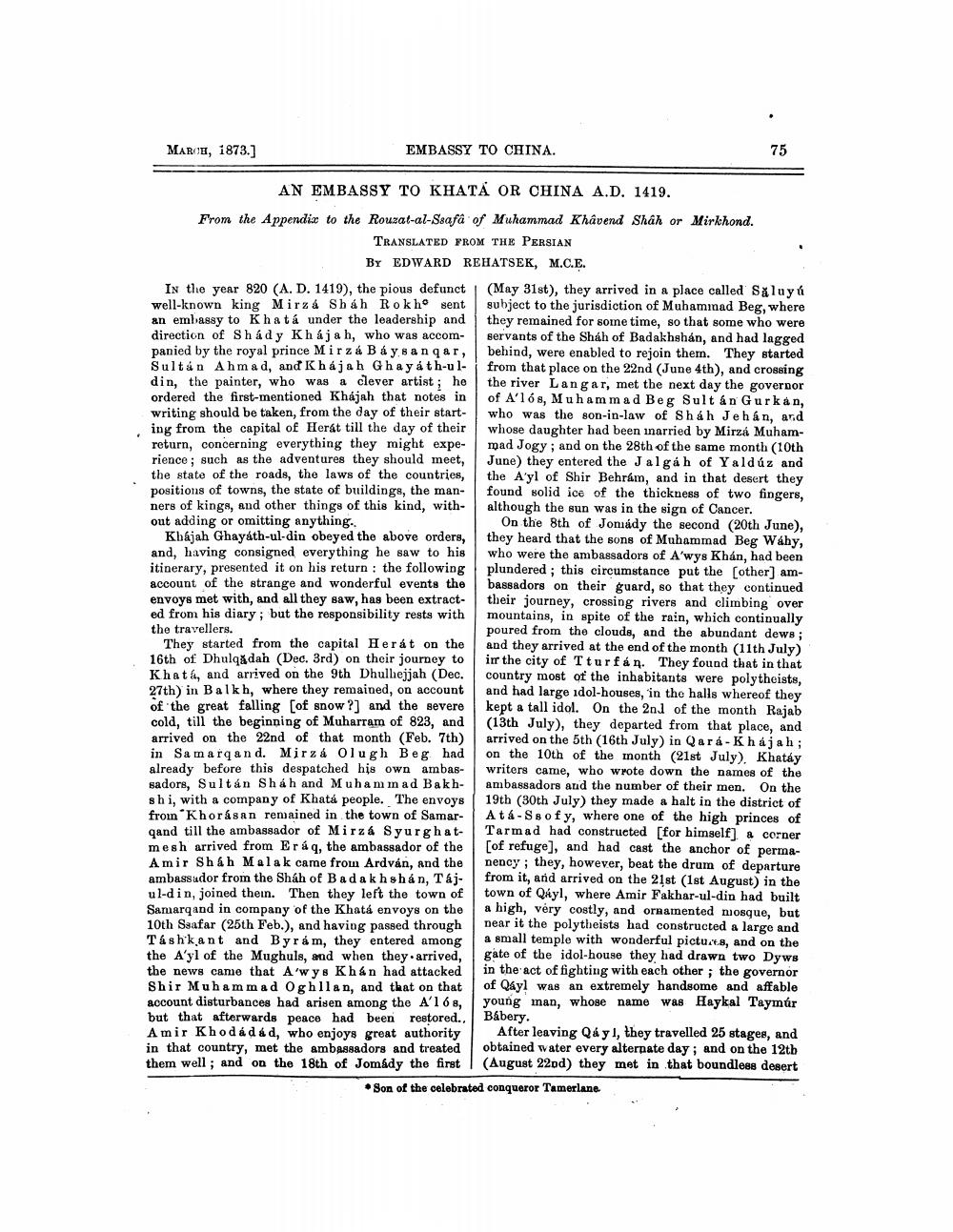________________
MARCH, 1873.]
EMBASSY TO CHINA.
AN EMBASSY TO KHATA OR CHINA A.D. 1419.
From the Appendix to the Rouzat-al-Ssafa of Muhammad Khâvend Shah or Mirkhond.
TRANSLATED FROM THE PERSIAN BY EDWARD REHATSEK, M.C.E.
In the year 820 (A. D. 1419), the pious defunct well-known king Mirzá Sháh Rokh sent an embassy to Khatá under the leadership and direction of Shády Khájah, who was accompanied by the royal prince Mirz á Báysanqar, Sultan Ahmad, and Khájah Ghayath-uldin, the painter, who was a clever artist; he ordered the first-mentioned Khájah that notes in writing should be taken, from the day of their starting from the capital of Herát till the day of their return, concerning everything they might experience; such as the adventures they should meet, the state of the roads, the laws of the countries, positions of towns, the state of buildings, the manners of kings, and other things of this kind, without adding or omitting anything..
Khájah Ghayáth-ul-din obeyed the above orders, and, having consigned everything he saw to his itinerary, presented it on his return: the following account of the strange and wonderful events the envoys met with, and all they saw, has been extracted from his diary; but the responsibility rests with the travellers.
(May 31st), they arrived in a place called Saluyú subject to the jurisdiction of Muhammad Beg, where they remained for some time, so that some who were servants of the Sháh of Badakhshan, and had lagged behind, were enabled to rejoin them. They started from that place on the 22nd (June 4th), and crossing the river Langar, met the next day the governor of A'lós, Muhammad Beg Sultan Gurkan, who was the son-in-law of Sháh Jehán, and whose daughter had been married by Mirza Muhammad Jogy; and on the 28th of the same month (10th June) they entered the Jalgáh of Yaldúz and the A'yl of Shir Behrám, and in that desert they found solid ice of the thickness of two fingers, although the sun was in the sign of Cancer.
On the 8th of Jonády the second (20th June), they heard that the sons of Muhammad Beg Wáhy, who were the ambassadors of A'wys Khán, had been plundered; this circumstance put the [other] ambassadors on their guard, so that they continued their journey, crossing rivers and climbing over mountains, in spite of the rain, which continually poured from the clouds, and the abundant dews; and they arrived at the end of the month (11th July) in the city of Tturfán. They found that in that country most of the inhabitants were polytheists, and had large idol-houses, in the halls whereof they kept a tall idol. On the 2nd of the month Rajab (13th July), they departed from that place, and arrived on the 5th (16th July) in Qará-Khájah; on the 10th of the month (21st July). Khatay writers came, who wrote down the names of the ambassadors and the number of their men. On the 19th (30th July) they made a halt in the district of Atá-Ssofy, where one of the high princes of Tarmad had constructed [for himself] a corner [of refuge], and had cast the anchor of permanency; they, however, beat the drum of departure from it, and arrived on the 21st (1st August) in the town of Qáyl, where Amir Fakhar-ul-din had built a high, véry costly, and ornamented mosque, but near it the polytheists had constructed a large and a small temple with wonderful pictures, and on the gate of the idol-house they had drawn two Dyws in the act of fighting with each other; the governor of Qáy was an extremely handsome and affable young man, whose name was Haykal Taymúr Bábery.
After leaving Qáy 1, they travelled 25 stages, and obtained water every alternate day; and on the 12th (August 22nd) they met in that boundless desert Son of the celebrated conqueror Tamerlane.
75
They started from the capital Herát on the 16th of Dhulqadah (Dec. 3rd) on their journey to Khatá, and arrived on the 9th Dhulhejjah (Dec. 27th) in Balkh, where they remained, on account of the great falling [of snow?] and the severe cold, till the beginning of Muharram of 823, and arrived on the 22nd of that month (Feb. 7th) in Samarqand. Mirzá Olugh Beg had already before this despatched his own ambassadors, Sultán Sháh and Muhammad Bakhshi, with a company of Khatá people. The envoys from Khorasan remained in the town of Samarqand till the ambassador of Mirza Syurghatmesh arrived from Erá q, the ambassador of the Amir Shah Malak came from Ardván, and the ambassador from the Sháh of Badakhshan, Tájul-din, joined them. Then they left the town of Samarqand in company of the Khatá envoys on the 10th Ssafar (25th Feb.), and having passed through Táshkant and Byrám, they entered among the A'yl of the Mughuls, and when they arrived, the news came that A'wys Khán had attacked Shir Muhammad Oghllan, and that on that account disturbances had arisen among the A'l 68, but that afterwards peace had been restored.. Amir Khodádád, who enjoys great authority in that country, met the ambassadors and treated them well; and on the 18th of Jomády the first




